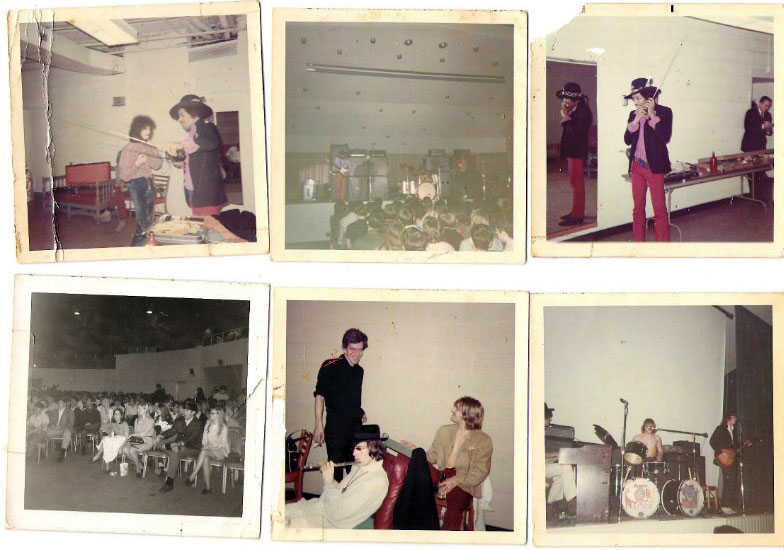
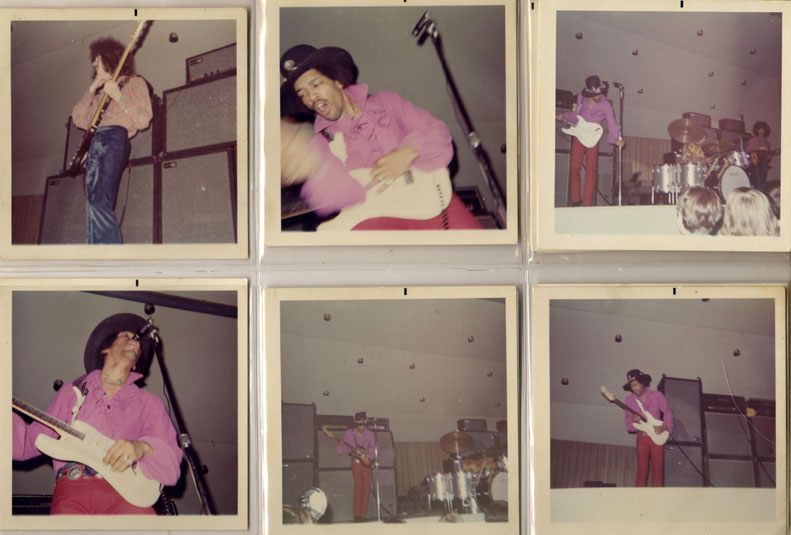
Bill Stokley writes:
The Virginia Beach Dome seated about 1000 people. I was 16 and got to drive to the show myself!!! What a show! Jimi blew the doors off the place. You could walk right up to the stage and take pics. Got one of Jimi sliding down the neck during Foxy Lady.
I remember using a little camera that was my moms. The negatives were stolen back in high school.
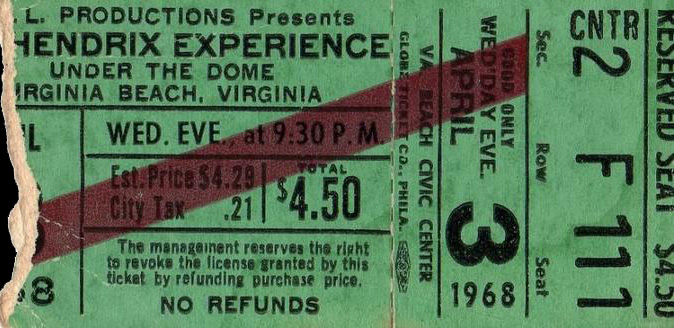
Update, February 2012
As the ticket stub above clearly shows, the first Hendrix show was on April 3, 1968, not the 4th as I had posted before. The 4th was the day Dr. Martin Luther King was assassinated in Memphis. Thanks to James for bringing this to my attention.
However, some Hendrix references state the concert took place on the 4th (source seems to be Noel Redding’s diary). One commenter below remembers the news about Martin Luther King’s assassination spreading during the concert, which would indicate the 4th. Was the date changed from the 3rd to the 4th?
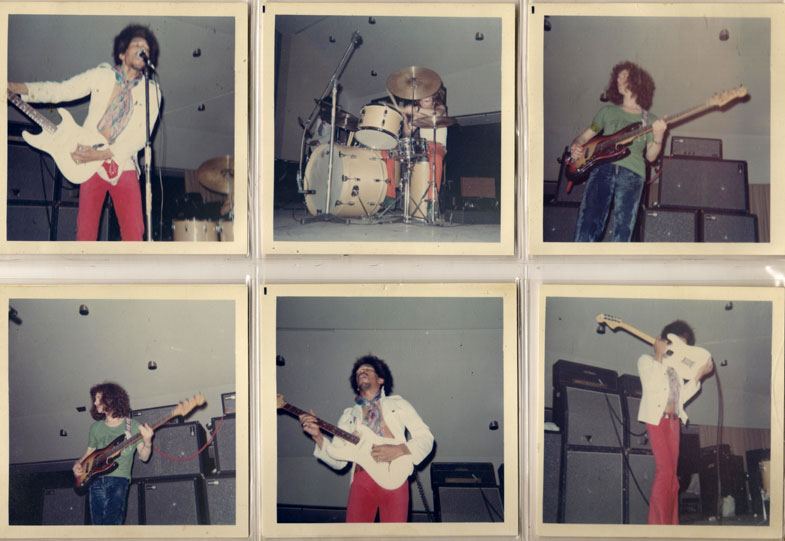
Eon sent in the following set of photos from the same show. Jimi may not have played very long, but the ending was spectacular:
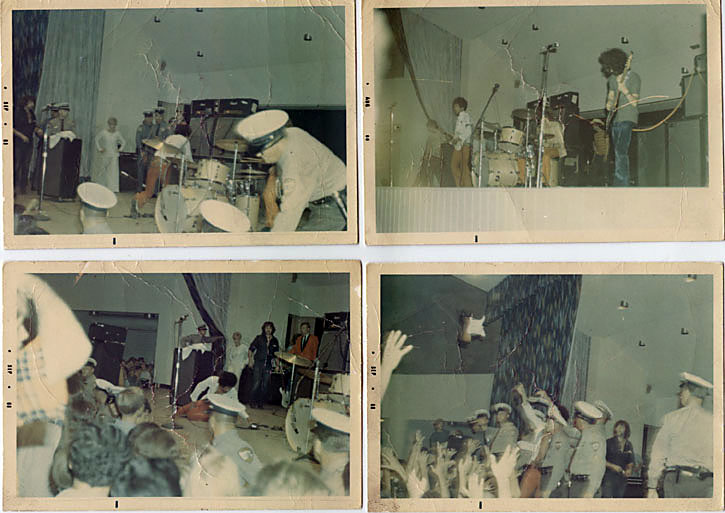
I played drums (poorly) in High School at Virginia Beach but still really liked to hear a good drummer. In 1968 I had a picture in my bedroom of Robert Wyatt playing drums for Soft Machine right next to my Peace Poster bought a shop on Eden Alley. Eden Alley hosted a series of hippy paraphernalia stores from an alley just off Virginia Beach Blvd. between Atlantic and Pacific Avenues.
That summer of 1968 I begged my parents to let me go to my first concert…to see the Soft Machine at the Virginia Beach Dome, August 21, 1968. Soft Machine was opening for a guitarist-led trio that was also getting a bit of press at the time. I had just turned 16 in May and so I had only recently gotten my drivers license and they were reluctant to let me go.
There were two shows that night. Because of my age my folks finally capitulated and said I could go to the first show…not the second. I argued with my mother over what to wear to a “concert”. She said you need to dress up (suit & tie!) for a concert. She was unconvinced that this “concert” would be different and refused to let me leave the house without at least loafers, nice pants and a collared shirt. I smuggled some blue jeans, tennis shoes and a t-shirt into the car and changed my clothes on the way. (I went to this concert by myself but cannot remember why)
That summer evening I drove the 6 miles from my house in Kings Grant (subdivision) to the Virginia Beach Dome. When I pulled into the parking lot I had one of those “we’re not in Kansas anymore” reactions as I quickly saw that my attempt at “casual hipness” missed in ways that I could have never imagined. Jeez there were lots of strange looking people in the parking lot! The show was introduced by a local goofy WGH-AM radio host Gene Loving, who couldn’t turn off the “AM radio” approach.
Once I was inside and seated (I actually had an excellent view if I remember correctly) the first band Eire Apparent performed a mildly psychedelic set that was pretty cool but not particularly memorable.
Next up, The Soft Machine (Cuneiform Records is doing an excellent job releasing many Soft Machine rarities). This version of the band was three musicians: Robert Wyatt, Kevin Ayers, & Michael Ratledge. The bass player left the tour about one month before they arrived at Virginia Beach. His name was Andy Summers (yep, the very same bassist later to be in the Police).
As for the set: an extremely intense and loud set ensued featuring music from the first and second Soft Machine records. At the end of the set, Ratledge pushed his organ off the stage causing such severe feedback that my ears are still suffering! Gene Loving attempted his AM stage patter over the raging feedback but quickly gave up. Finally, they shut down the power in the entire building to quiet the feedback but of course, plunging the whole place into darkness. About 20 minutes later the Jimi Hendrix Experience took the floor…
Though Hendrix performed and did various acrobatic stunts he left his guitar intact by the end of the first show. I cannot remember ANY details of the performance other than I came out the other side with a new religion! The general thought was that the destruction of Ratledge’s organ was a “gift” to those expecting destruction from Hendrix. According to friends who attended the second set, Hendrix burned his guitar. As result of that action Hendrix became the first of two hard rock bands in the 60s to be banned forever from the state of Virginia. The second band was the MC5 who played at a small club in Hampton and incited attendees to riot during their show.
This is my ticket stub with tape marks: In the late 60s I kept a scrapbook of the developing music and political scene.
Chuck’s ticket stub to Hendrix, Soft Machine, & Eire Apparent
Thank you Bill, Diane, Chuck and Eon!




 Sound On Sound were from Grundy in the western part of Virginia, close to a three hour drive to any large city like Roanoke or Johnson City, Tennessee.
Sound On Sound were from Grundy in the western part of Virginia, close to a three hour drive to any large city like Roanoke or Johnson City, Tennessee.

















